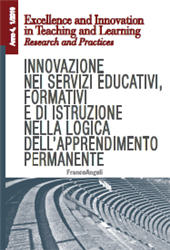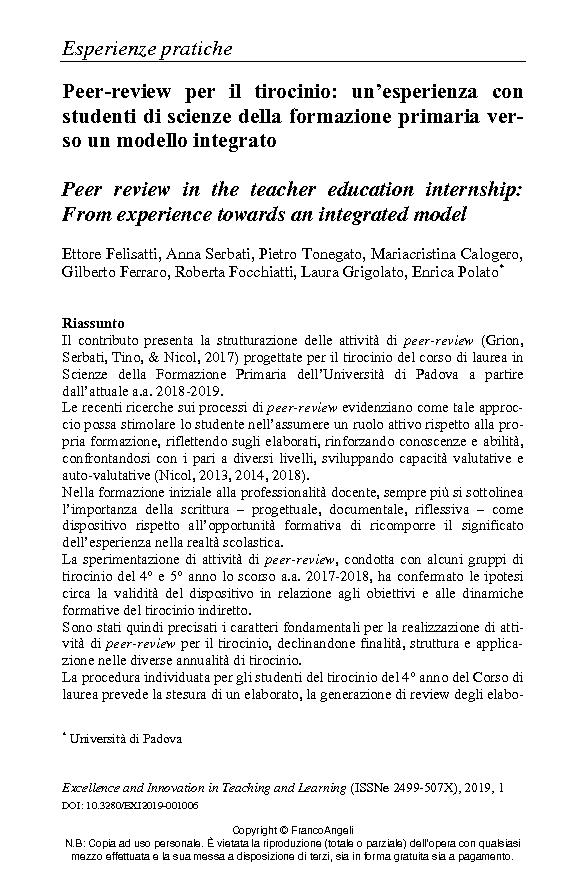Peer-review per il tirocinio : un'esperienza con studenti di scienze della formazione primaria verso un modello integrato
92-102 p.
Il contributo presenta la strutturazione delle attività di peer-review (Grion, Serbati, Tino, & Nicol, 2017) progettate per il tirocinio del corso di laurea in Scienze della Formazione Primaria dell'Università di Padova a partire dall'attuale a.a. 2018-2019. Le recenti ricerche sui processi di peer-review evidenziano come tale approccio possa stimolare lo studente nell'assumere un ruolo attivo rispetto alla propria formazione, riflettendo sugli elaborati, rinforzando conoscenze e abilità, confrontandosi con i pari a diversi livelli, sviluppando capacità valutative e auto-valutative (Nicol, 2013, 2014, 2018). Nella formazione iniziale alla professionalità docente, sempre più si sottolinea l'importanza della scrittura - progettuale, documentale, riflessiva - come dispositivo rispetto all'opportunità formativa di ricomporre il significato dell'esperienza nella realtà scolastica.erimentazione di attività di peer-review, condotta con alcuni gruppi di tirocinio del 4° e 5° anno lo scorso a.a. 2017-2018,
ha confermato le ipotesi circa la validità del dispositivo in relazione agli obiettivi e alle dinamiche formative del tirocinio indiretto. Sono stati quindi precisati i caratteri fondamentali per la realizzazione di attività di peer-review per il tirocinio, declinandone finalità, struttura e applicazione nelle diverse annualità di tirocinio. La procedura individuata per gli studenti del tirocinio del 4° anno del Corso di laurea prevede la stesura di un elaborato, la generazione di review degli elaborati dei pari e di un elaborato exemplar preparato da un tutor, la scrittura degli inner feedback, la realizzazione della riflessione conclusiva, in vista della definitiva redazione del testo. [Testo dell'editore].
The paper presents the structure of the peer-review activities (Grion, Ser-bati, Tino, & Nicol, 2017) planned during the internship for Pre-service Teacher Education students at the University of Padova. These activities refer to the current a.a. 2018-2019 and will continue in the next academic years, too. Recent research on peer-review shows how this approach fosters students to take an active role in their learning, reflecting on their own assignments, reinforcing knowledge and skills, learning by sharing and compar-ing perspectives with peers at different levels, developing assessment and self-assessment skills (Nicol, 2013, 2014, 2018). In the initial development of the teacher's professionality, the importance of writing - interpreted as an exercise for planning, documenting, reflecting - is emphasised, because it represents an opportunity for students to understand and elaborate a personal meaning related to the experience that they live in the school context.
In a.a. 2017-2018 a first pilot project with 6 groups of students during their 4th and 5th-year was carried out, asking students to peer review internship projects mutually. This experience confirmed the importance of reflective writing about the main aims of the internship. Fundamental elements to carry out peer-review activities for the intern-ship were then specified, defining purposes, structure and implementation during the internship years. The procedure identified for 4th-year students includes: drafting an assignment concerning the internship experience, reviewing peers' work including one high-quality assignment exemplar, writing inner feedback after reviewing, participating to a final collective reflection, in order to update the personal assignment towards the final drafting and submission. [Publisher's text].
Fait partie de
Excellence and innovation in learning and teaching : research and practices : 4, 1, 2019-
Articles du même numéro (disponibles individuellement)
-
Informations
Code DOI : 10.3280/EXI2019-001006
ISSN: 2499-507X
DISCIPLINES
KEYWORDS
- Peer-review, feedback tra pari, tirocinio, valutazione, autovalutazione
- Peer-review, peer feedback, internship, assessment, self-assessment



